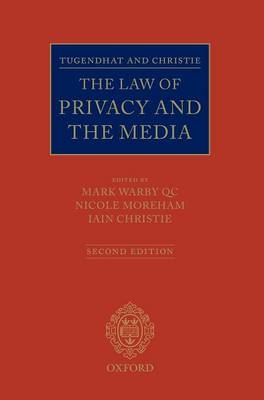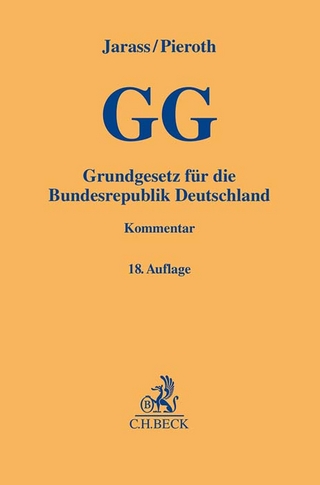
Tugendhat and Christie
Oxford University Press (Verlag)
978-0-19-958115-3 (ISBN)
- Titel ist leider vergriffen;
keine Neuauflage - Artikel merken
The first edition of this book quickly established itself as the leading reference work on the rapidly developing law of privacy in England and Wales, and the specialist team of barristers from 5RB(the media, entertainment and human rights chambers) and expert academic foreign law contributors have now prepared a timely new edition. Many of the contributors have appeared or advised in the leading cases which are shaping the law of privacy. The book considers how the law protects the publication of personal information without undermining the fundamental principle of freedom of expression. Since the first edition was published the law of privacy has developed considerably. As predicted by the authors, a separate and distinct cause of action, known as "misuse of personal information" has been created, though its precise remit is still being defined by the courts. Alongside this new tort or equitable remedy, traditional causes of action (most notably breach of confidence) remain available to provide remedies for invasions of privacy.
The common law continues to be influenced by the competing rights under Articles 8 and 10 of the European Convention on Human Rights and its concurrent Strasbourg jurisprudence and, to a lesser extent, by application of the principles established in the Data Protection Act 1998. The case law is developing on a case by case basis, drawing on comparative legal and academic sources where appropriate. Against this background the debate as to whether Parliament should enact a general law of privacy rumbles on. Although intended as a practitioners' guide to the law, this major work includes a consideration of comparative and international jurisprudence, as well as leading academic writings on the subject, in order to elaborate the principles upon which privacy rights are based. These may helpfully guide the development of English law in the years ahead. The structure moves from the historical and contextual, through the academic and comparative, to the practical and developing law. At the heart of the book is an explanation of existing causes of action which may be used to protect personal privacy and practical advice on defences and remedies that may be available.
It is recognized that recent legislation, most notably the Data Protection Act 1998 and the Human Rights Act 1998, has had a significant impact on the law in this area and full consideration is given to their application. A vast range of important recent case law is also analysed, including Max Mosley v News Group Newspapers Ltd, the J.K Rowling case and Terry v Persons Unknown. The topic of super-injunctions is addressed as are the latest proposals for reform of the law in this rapidly-developing and highly controversial field. The work was also cited favourably in the Court of Appeal judgment for KGM v News Group. This work was also cited favourably in the Court of Appeal judgment for KGM v News Group. Tugendhat and Christie: The Law of Privacy and the Media is essential reading for all those who act for or against the media, as well as all those with a general interest in the subject.
Iain Christie is a barrister at 5RB specialising in the human rights aspects of media law, in particular the relationship between the right of personal privacy and the right to freedom of expression. Prior to joining 5RB he was a legal adviser to the Foreign & Commonwealth Office and acted for the Government in a number of high profile cases before the European Court of Human Rights. He has been the UK representative on various international negotiations at the United Nations and Council of Europe and has worked on several Parliamentary Bills including the Human Rights Act 1998. He is now on the Attorney General's panel of junior counsel to the Crown. Iain appeared in the House of Lords for the Claimants in Wainwright v Home Office, for which he was nominated for the Bar Pro Bono Award in 2003, and more recently for Michael Durant in his bid to overturn the controversial Court of Appeal ruling on access to personal data. Dr Nicole Moreham is a Senior Lecturer at the Faculty of Law, University of Wellington. She joined in 2006 having spent seven years at Gonville and Caius College, University of Cambridge, first as a Masters and PhD student and then as a Fellow and Lecturer in Law. She completed her undergraduate Honours degree at the University of Canterbury and worked as a judges' clerk at the New Zealand Court of Appeal. Nicole's doctoral thesis is entitled 'Privacy and the Common Law' and she continues to research and publish on privacy law. Her research interests also extend to other aspects of media law and to the law of tort and she taught the law of contract and administrative law for several years at Cambridge. Mark Warby QC is a leading silk in media, entertainment and sports law at 5RB. Over the years he has acted for and against all the national newspaper groups, and major broadcasters, national, regional and local newspapers and magazines and several Internet organisations (Demon, AOL, Google). Claimant clients have included many well known figures from the worlds of entertainment, the media, sport and politics. Defamation, privacy and data protection are substantial elements of his practice. Notable recent cases include Max Mosley v News Group (privacy of S&M activities), Atlantis v L'Espresso (for Italian magazine, defeating corporate libel claims over minimal English publication), Murray v Big Pictures (for agency, defending J K Rowling's claim over pictures of her infant son).
I SOURCES, PRINCIPLES AND RIGHTS ; 1. Context and Background ; Introduction ; Common Law and Equity ; Legislation ; The Media Codes and the 'New Media' ; Reviews and Reform ; The European Convention on Human Rights and the Human Rights Act 1998 ; 2. Privacy Rights ; Introduction ; The Scope of the Privacy Interest ; The Rationale for Protecting Privacy ; 3. Privacy in Europe and the Common Law ; Introduction ; Sources of English Privacy Law ; Privacy in Other Jurisdictions: The Common Law ; Privacy in European Civil Law ; II PUBLICATION OF PERSONAL INFORMATION ; 4. Breach of Confidence ; Introduction ; The Cause of Action for Breach of Confidence: An Overview ; Classification of Confidential Information ; Criteria for Confidentiality ; The Duty of Confidence ; 5. Misuse of Personal Information ; Introduction ; Overview of the Cause of Action ; When Is There a Reasonable Expectation of Privacy? ; Evaluating Article 8 Rights in the 'Ultimate Balancing Test' ; 6. Data Protection and the Media ; Introduction ; Data Protection ; Data Protection Act 1998 ; 7. Privacy, Defamation and False Facts ; Introduction ; Protection of Privacy by Defamation Law ; Conflict between Defamation and Privacy ; 8. Publication of Personal Information: Special Issues ; Introduction ; Elements of Wrongful Disclosure of Private Information ; Rights and Enforcement ; IIII COMMERCIAL RIGHTS AND INTRUSION ; 9. Copyright, Moral Rights, and the Right to One's Image ; Introduction ; Privacy Interests and Copyright Subject Matter ; The Limitations on Exclusive Rights for News Reporting and Other Publication ; The Collision between Copyright and the Privacy Rights of Third Parties ; Moral Rights ; Publicity Rights ; 10. Intrusion ; Introduction ; Common Law Protection against Intrusion ; Legislative Protection against Intrusion ; Scope for Developing an Intrusion Tort ; IV PRIVACY REGULATION ; 11. The Privacy Codes ; Introduction ; The Human Rights Act 1998 ; The Data Protection Act 1998 ; Judicial Remedy or Regulatory Complaint ; The Regulatory Bodies ; The Codes and Adjudications ; The Regulatory Bodies as Public Authorities ; Application of the Codes to 'New Media' ; V DEFENCES ; 12. Justifications and Defences ; Introduction ; Defences of General Application ; Defences to Claims for Disclosure of Private Facts ; Defences to Claims for Intrusive Acts ; Defences to False Light Claims ; Defences to Appropriation of Name or Likeness Claims ; Limitation of Actions ; VI REMEDIES ; 13. Remedies ; Introduction ; Human Rights Act 1998, s12 ; Injunctions ; Damages ; Other Remedies ; VII THE ACTION ; 14. Privacy and Procedure in Privacy Cases ; Introduction ; Who? Claimants, Defendants and Others ; What? Remedies, Routes, Causes of Action, and Applicable Law ; When? Timing and Limitation ; Where? Jurisdiction and Venue ; How? Conduct of the Action ; 15. Privacy in Court Proceedings ; Introduction ; Physical Access to the Courtroom ; Control of Access to Court Documents ; Restrictions on the Reporting of Proceedings Held in Private ; Restrictions on the Reporting of Proceedings Held in Public ; Restrictions on the Use of Material that is Disclosed in the Course of Court Proceedings ; VIII THE PRIVACY RIGHTS OF THE MEDIA ; 16. Protection of Journalistic Material ; Introduction ; Protection of Sources: The Common Law ; Contempt of Court Act 1981, s10 ; Access to Journalists' Sources: Statutory Powers
| Erscheint lt. Verlag | 3.3.2011 |
|---|---|
| Verlagsort | Oxford |
| Sprache | englisch |
| Gewicht | 1751 g |
| Themenwelt | Recht / Steuern ► EU / Internationales Recht |
| Recht / Steuern ► Öffentliches Recht ► Verfassungsrecht | |
| Recht / Steuern ► Privatrecht / Bürgerliches Recht ► IT-Recht | |
| Recht / Steuern ► Privatrecht / Bürgerliches Recht ► Medienrecht | |
| ISBN-10 | 0-19-958115-0 / 0199581150 |
| ISBN-13 | 978-0-19-958115-3 / 9780199581153 |
| Zustand | Neuware |
| Haben Sie eine Frage zum Produkt? |
aus dem Bereich


